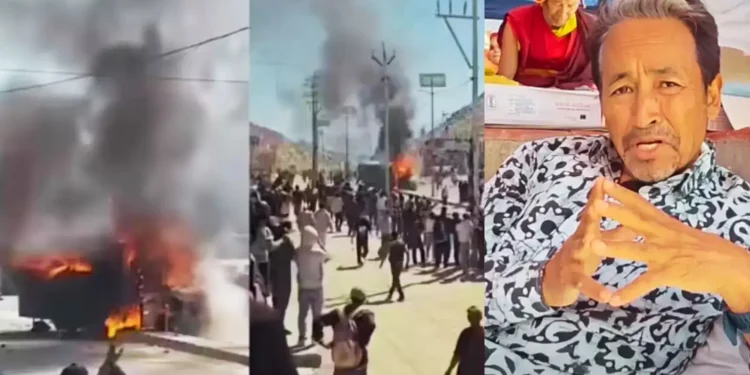“Indian police have detained Ladakh activist Sonam Wangchuk following violent protests that left multiple dead. Learn the background, charges, and political implications in this detailed report.”
Activist Sonam Wangchuk Arrested Amid Deadly Ladakh Protests
Protest Erupts: Clashes Turn Lethal
On 25–26 September 2025, violent demonstrations demanding statehood and greater autonomy rocked Leh, the capital of Ladakh. Protesters clashed with security forces after setting ablaze police vehicles and the local BJP office, prompting police to resort to live fire. Four protesters were killed and dozens more injured.
The unrest followed a 14-day hunger strike by prominent local activist Sonam Wangchuk. His fast had been a nonviolent bid to press demands for constitutional safeguards, local job quotas, and elected local governance. As tensions escalated, officials accused Wangchuk of incitement through “provocative statements,” a charge he dismissed, attributing the violence to deep-rooted frustration against central policies.
In the wake of the clashes, authorities imposed a curfew, suspended mobile internet services in Leh, and canceled the Foreign Contribution Regulation Act (FCRA) licence of Wangchuk’s NGO, Students’ Educational and Cultural Movement of Ladakh (SECMOL), citing alleged violations.
The Arrest: Charges and Transfer
On 26 September, Wangchuk was arrested by Indian police ahead of a scheduled press conference. Authorities detained him under the National Security Act (NSA)—a stringent law allowing preventive detention without formal charges in certain cases.
Soon afterward, Wangchuk was transferred to Jodhpur Central Jail, over a thousand kilometers away—raising questions about access to legal counsel and his ability to mount a defense from such a remote location.
His supporters, political opponents, and civil society groups have expressed alarm over what they see as disproportionate use of security laws against dissent. Several opposition parties have condemned the arrest, calling it part of a broader crackdown on civil activism.
Who Is Sonam Wangchuk?
Sonam Wangchuk is an engineer, educator, and environmental innovator from Ladakh. He founded SECMOL in 1988 to reform educational practices in the region.
He is perhaps best known for devising “ice stupas”, artificial glaciers that store winter water to address water scarcity in high-altitude terrain. His work earned him the prestigious Ramon Magsaysay Award in 2018.
His reputation as an environmentalist and reformer made him a popular local figure and the presumed voice of Ladakh’s younger activists pushing for self-governance and protection of tribal rights.
Underlying Causes: What the Protest Reflects
The recent protests are rooted in longstanding tensions tied to Ladakh’s status. In 2019, New Delhi revoked Kashmir’s special status, bifurcating Jammu & Kashmir and placing Ladakh under direct federal administration—effectively dissolving regional autonomy.
Local inhabitants have since demanded constitutional protections—via inclusion in the Sixth Schedule—and guarantees for tribal land, ecological management, and local electoral governance. Wikipedia
Many protesters view the central government’s development policies, especially concerning infrastructure and resource extraction in ecologically fragile zones, as threatening to Ladakh’s environment and cultural identity.
The violent escalation exposed tensions between aspirations for self-rule and central state authority, especially when local grievances clash with national security concerns.
Legal, Political, and Human Rights Implications
Wangchuk’s arrest under NSA has triggered debate about the use of preventive detention and restrictions on dissent. Critics argue that applying national security laws to civil protest sets a dangerous precedent.
The cancellation of SECMOL’s FCRA licence curtails the NGO’s ability to receive foreign funding—a move seen by some as part of a broader strategy to weaken civil society organizations in conflict-prone or politically volatile regions.
Wangchuk’s transfer far from Ladakh complicates access for his legal team and monitoring by human rights observers. It also highlights challenges in ensuring that detainees enjoy fair procedure, especially in remote or peripheral jurisdictions.
Internationally and domestically, the case may draw scrutiny from human rights groups, press freedom advocates, and bodies concerned with civil liberties. The government will likely argue that its actions were necessary to prevent further violence and maintain order.
What Comes Next?
A new round of talks between Ladakh’s political leadership and Central government officials is scheduled for 6 October 2025, offering a potential diplomatic opening to address the region’s demands.
Wangchuk’s case will now move through India’s legal system, where questions over procedural fairness, access to counsel, and the legitimacy of NSA charges will likely be contested.
Meanwhile, the protests reflect deeper tensions over identity, autonomy, and environmental stewardship in frontier regions. How New Delhi responds may shape the trajectory of not just Ladakh’s political future, but also India’s broader approach to dissent, regional demands, and governance in its peripheral zones.
READ ALSO…..India–US Trade Deal May Include Strategic Oil “Grand Bargain,” Says New Jersey Governor 2025















 Categories
Categories









